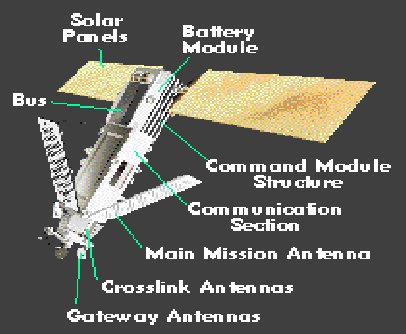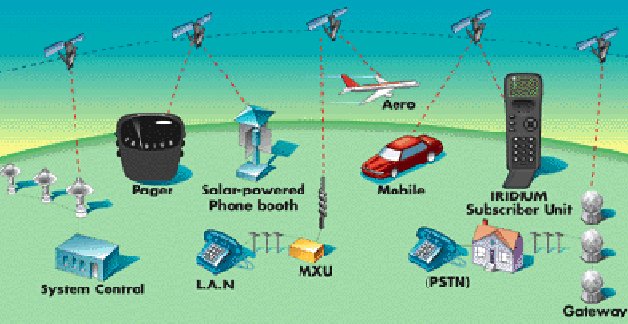THE IRIDIUM PROJECT: 
AN EVOLUTION OF A VISION
By Abram Detofsky (detofsky@seds.org)
When you hear the word “iridium,” what thoughts first come to mind? For some, it conjures up images of a sleek
high-performance sports car. The Iridium Z80 has a certain ring to it, doesn’t it? If you were more science-minded,
you might recognize “Iridium” as the 77th element of the periodic table. For the engineers at Motorola, however,
“Iridium” represents a global revolution in the way we will communicate in the not-so-distant future. This is the
Iridium vision. Before a discussion of the Iridium concept is developed, one must first understand the current
weaknesses of cellular phone technology. Current cellular systems are limited by the ground-based coverage that
is available in a calling area. When a cellular phone call is placed, receiving tower “cells” in the area receive
the signal and compete with one another for exclusive rights to the communication. The one receiving the strongest
signal wins and the others are locked out of communication with the phone. As the person making the phone call
leaves the receiving area and into the receiving zone of a neighboring cell, the new cell will take over for the
old more distant one to provide the strongest signal possible. The system works well in densely populated areas
where cellular coverage is complete. However, the coverage in most parts of the world is sparse, so acquiring a
nearby cell of sufficient signal strength is often impossible. Additionally, not all cellular networks are compatible
with one another, so a phone made for one network may not work on another. Bridging these coverage “holes” is a
primary motivation for moving to a new system.
Iridium received its unusual name because the satellite constellation originally was intended to include a total
of 77 satellites. Since 77 is the atomic number for the element, Iridium, it seemed like a good choice. Later,
the total number of satellites was reduced from 77 to 66. Since ‘Dysprosium’ doesn’t sound as sexy as ‘Iridium’,
the old name was kept.
The Iridium proect is destined to revolutionize the way we communicate with one another. It does so by moving the
bulk of the communication from ground-based cell towers to a space-based constellation of satellites. The Iridium
concept consists of a network of 66 high-performance communications satellites placed in low-earth polar orbits
(421 miles above the earth) that allow for complete global communications coverage 24-hours a day. The constellation
consists of 6 orbital planes with 11 satellites and one spare per plane. Each satellite has a 5-year expected lifetime.
Ground-based “gateways” allow for the Iridium satellite network to communicate seamlessly with the conventional
telephone networks. What this system amounts to is point-to-point communication from anywhere in the world to anywhere
in the world, a reality that is not yet possible with existing commercial technologies.
Iridium is the brainchild of Motorola executive Bary Bertiger. Back in 1984 while on vacation in the Caribbean,
he dreamt of one day placing a call from anywhere in the world. In 1991, Iridium Inc. was created, and in 1992
a $3.37 billion project contract was signed. In 1997, Iridium placed 47 satellites (2/3 of the total constellation)
into orbit and received the first satellite-based pager message. Currently there are 49 satellites in orbit with
the last launch being February 18, 1998.
Although, Iridium will give people global coverage for pagers and phones, there are several issues which may delay
the acceptance of the system. First, even though Iridium phones will be relatively compact hand-helds, they will
cost in excess of $2000 per unit. Additionally, it is estimated that charges will be between $1 and $3 per minute.
Business travelers may still opt for the local cellular services even though it may fade in and out because it
will cost a small fraction of an Iridium phone. Secondly, international laws may forbid Iridium communication to
some countries, effectively making Iridium’s reach less than global. Lastly, it is still debatable whether everyone
will want to be reached anywhere in the world. Some would argue that one of the benefits to international travel
is being inaccessible to those back at the office. Regardless of these potential shortcomings, Iridium will be
challenging our notions on wireless communication in the very near future.
